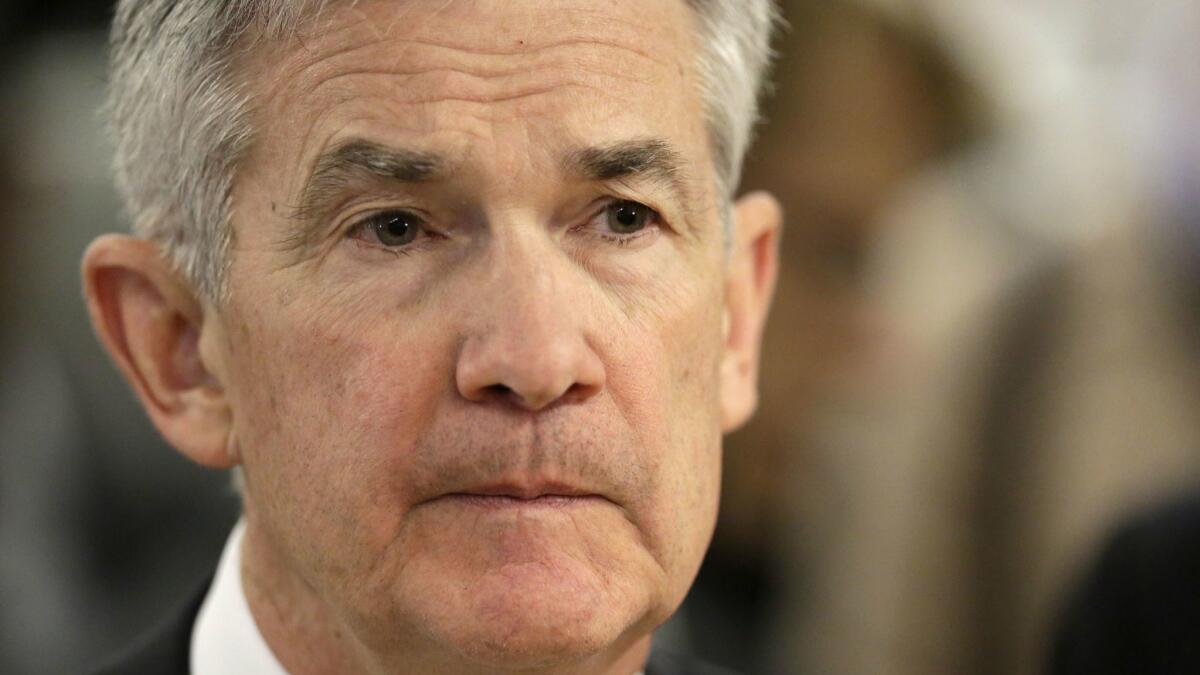Fed on track to raise interest rates in June on belief economy remains in good shape

- Share via
Federal Reserve officials believe the economic outlook warrants another interest rate hike “soon” but signaled they would allow inflation to go modestly above their 2% target — indicating they’re in no rush to raise rates more aggressively.
That was the takeaway from the minutes released Wednesday of the Federal Open Market Committee, which met May 1-2 to discuss the nation’s interest rate policy.
A temporary period of inflation “modestly above 2 percent would be consistent with the committee’s symmetric inflation objective and could be helpful in anchoring longer-run inflation expectations,” the minutes said.
Investors already widely expect officials to raise rates when the FOMC meets June 12-13, according to interest rate futures prices. Policymakers have been split on whether a total of three or four hikes are warranted for the full year.
Fed officials met in May after data showed price gains finally hitting their target after undershooting for most of the last few years.
New York Fed President William Dudley and San Francisco’s John Williams, who’ll replace him next month, have both since said they’re comfortable with a modest inflation overshoot, signaling no rush to speed up the central bank’s gradual pace of policy tightening.
Inflation, according to the Fed’s preferred indicator, reached 2% in March. Data released two days after the meeting showed unemployment dipped in April to 3.9%, the lowest since 2000, while year-over-year gains in average hourly earnings were steady at 2.6%.
At the meeting, U.S. central bankers left the target range for the benchmark policy rate unchanged at 1.5% to 1.75% after raising rates in March.
Financial markets were unsettled in the days running up to the May meeting amid concerns over a U.S.-China trade dispute, with stock prices falling and 10-year Treasury yield rising toward 3%.
President Trump has threatened tariffs on as much as $150 billion in Chinese imports, with China vowing to retaliate in kind. Though the nations announced a truce over the weekend, Trump has since said he wasn’t pleased with the trade negotiations, and tweeted Wednesday that the U.S. may need to change the direction of talks to get a final agreement.
During the May meeting, policymakers relayed concerns from regional business contacts who warned of possible adverse effects from tariffs and trade restrictions, such as delays or pullbacks in capital spending.
In addition, “it was noted that the potential for higher Chinese tariffs on key agricultural products could, in the longer run, hurt U.S. competitiveness,” the minutes said.
Still, Fed officials largely viewed the economy as in good shape and anticipated that the first-quarter slowdown in consumer spending would prove temporary, according to the report.
A few policymakers “emphasized the need to build additional resilience in the financial sector at this point in the economic expansion,” the minutes said, while noting that “leverage in the nonfinancial corporate sector remained elevated.”
The minutes showed officials also discussed the flattening yield curve, or the shrinking gap between the yields on long-dated Treasury bonds and short-term securities. That spread — which turned negative in the run-up to every recession in the last 40 years — has recently narrowed to around the lowest levels since 2007.
While a few policymakers said the yield curve may have become “a less reliable signal of future economic activity,” several others stressed that an inverted yield curve has historically “indicated an increased risk of recession,” according to the minutes.
More to Read
Inside the business of entertainment
The Wide Shot brings you news, analysis and insights on everything from streaming wars to production — and what it all means for the future.
You may occasionally receive promotional content from the Los Angeles Times.










